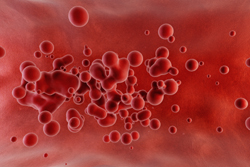New strategies to prevent tumour growth
The EC-funded ANTI TUMOR ANGIOGENESI project focused on the signalling process which is necessary in the capillary formation in malignant tumours. Preventing the signals from being transmitted could mean that angiogenesis is halted and the tumour starved of key nutrients. Researchers at the Medical University of Vienna made a series of observations regarding angiogenesis through a series of in vitro studies. The overexpression of the EGR-1 (Early growth response factor 1) protein from adenoviruses prevented a series of angiogenesis steps such as sprouting and tubule formation. Furthermore, prolonged EGR-1 expression led to apoptosis (programmed cell death). Analysis of this phenomenon indicated that EGR-1 induced these effects only when overexpressed and in fact low-grade expression leads to the induction of angiogenesis and proliferation. The overexpression mechanism is likely to initiate a feedback inhibition mechanism which eventually leads to a stop in angiogenesis. This line of research forms part of a whole series of observations likely to lead to new insights into the control of angiogenesis in cancer patients.







